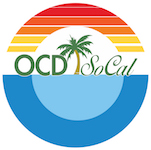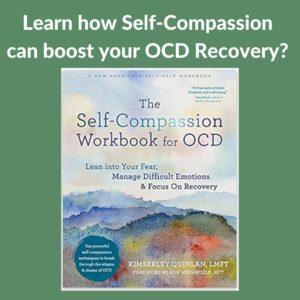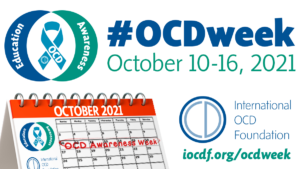[NOTE:] The following blog post comes from our guest contributor, Kim Quinlan, LMFT, who recently spoke at our OCD Awareness Week 2021 Event!:
Hello everyone,
If you suffer from obsessive-compulsive disorder (OCD), chances are you’re very not only familiar with feelings of anxiety, panic, shame, and uncertainty. You also experience the stigma associated with OCD, often making you feel unworthy of receiving the compassion and kindness you need and deserve.
In addition, chances are you are incredibly hard on yourself. After experiencing unwanted intrusive thoughts, feelings, sensations, images, and urges, you might find yourself engaging in harsh self-judgment, self-criticism, and self-punishment. While these behaviors are not your fault, they can actually hinder recovery and lead to additional mental health problems.
So, how can you break this destructive cycle and start living the life you want to live?
The answer is SELF-COMPASSION! Self-compassion is a powerful practice that involves you treating yourself the same way you would treat a loved one if they too were experiencing similar intrusive thoughts or struggling to not engage in compulsions. Self-compassion is being kind instead of judgmental when times are tough. Self-Compassion is the practice of cheering yourself on as you face your fears instead of berating yourself and saying words that only make you feel more hopeless.
Let’s take a closer look at this. Imagine that someone you love dearly came to you and said, “I have a disorder called OCD. It means I have intrusive, repetitive, unwanted thoughts, and I cannot make them stop. It is torture!” What might you say to them? Would you stop what you are doing to help them? How would your voice change? Would you speak softer or slower now that you know how much they are suffering? Would you reach out and touch them tenderly (if appropriate)? What form of support would you offer them?
Self-Compassion is saying and acting precisely this way, just this time saying and acting that way towards yourself. When you are struggling, you can choose to lean into your suffering and truly offer yourself warmth and kindness. In addition, when you are struggling, self-compassion can also include setting kind, compassionate limits with fear, reminding yourself that you no longer want to allow fear to make your choices for you anymore. These two important practices of self-compassion can be instrumental in OCD recovery.
Living with OCD can be extremely challenging, so adding self-compassion practices to your recovery can be life-changing. You are so much more than your disorder! And you deserve to be treated with the same respect and compassion.
If you are interested in learning more, I so excited to announce that I wrote a workbook that combines the practice of self-compassion with Exposure and Response Prevention (the gold-standard treatment for OCD). The Self-Compassion Workbook for OCD can be your guide to supporting and caring for yourself as you face your fears and practice managing uncertainty, anxiety, and doubt.
Thank you,
Kim Quinlan, LMFT
To purchase “The Self-Compassion Workbook for OCD,” by Kimberley Quinlan, LMFT, please visit HER OFFICIAL AMAZON PAGE HERE.




